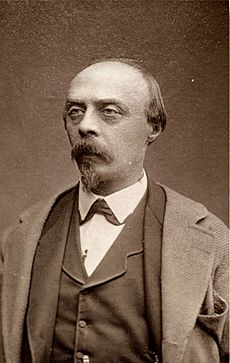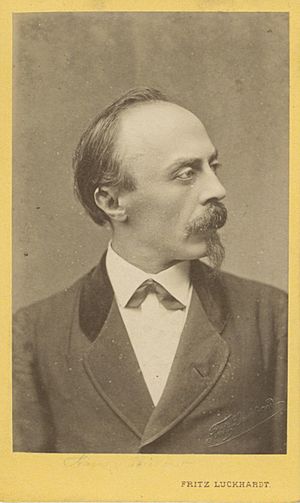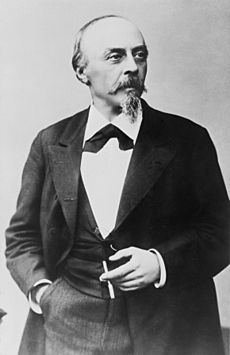Hans von Bülow facts for kids
Freiherr Hans Guido von Bülow (born January 8, 1830 – died February 12, 1894) was a famous German conductor, amazing pianist, and composer. He lived during the Romantic era of music. He was one of the most important conductors of his time. He helped make many major composers, like Richard Wagner and Johannes Brahms, very successful.
Hans von Bülow was one of the first and best students of the Hungarian composer and pianist Franz Liszt. He gave the very first public performance of Liszt's famous Sonata in B minor in 1857. He married Liszt's daughter, Cosima. However, Cosima later left him to marry Richard Wagner. Bülow was also known for how well he played the music of Ludwig van Beethoven. He was one of the first European musicians to tour the United States.
Contents
Early Life and Music Journey
Hans von Bülow was born in Dresden, Germany. His family was old and well-known. From the age of nine, he studied music with Professor Friedrich Wieck. Wieck was the father of the famous pianist Clara Schumann.
However, Hans's parents wanted him to study law, not music. So, they sent him to Leipzig. There, he met Franz Liszt. He also heard the first performance of Richard Wagner's opera Lohengrin in 1850. After hearing this, Hans decided to follow his passion for music. He chose to become a musician instead of a lawyer. He studied piano in Leipzig with the well-known teacher Louis Plaidy. His first job as a conductor was in Zurich in 1850. Richard Wagner himself recommended him for the job.
Becoming a Famous Musician
Hans von Bülow had a very strong personality. He sometimes spoke his mind directly, which could upset people he worked with. Because of this, he lost his job in Zurich. But at the same time, he started to become famous. He could conduct new and difficult music without needing the sheet music in front of him.
In 1851, he became a student of Franz Liszt. He married Liszt's daughter, Cosima, in 1857. They had two daughters, Daniela and Blandina. During the 1850s and early 1860s, he was very busy. He worked as a pianist, conductor, and writer. He became well-known across Germany and even in Russia. In 1857, he performed Liszt's Piano Sonata in B minor for the first time in Berlin.
Working with Wagner and Other Composers
In 1864, Hans von Bülow became the main conductor in Munich. This is where he became truly famous. He conducted the very first performances of two of Wagner's operas: Tristan und Isolde in 1865 and Die Meistersinger von Nürnberg in 1868. Both of these operas were huge successes.
Around this time, Cosima, his wife, fell in love with Richard Wagner. She had children with Wagner. Even though their relationship was widely known, Bülow did not want to divorce Cosima at first. He finally agreed to a divorce in 1870. After that, Cosima and Wagner got married. Bülow never spoke to Wagner again. However, he still respected Wagner's music. He continued to conduct Wagner's works and was sad when Wagner died in 1883. In 1882, he married the actress Marie Schanzer.
From 1867 to 1869, Bülow was the director of the Königliche Musikschule in Munich. He taught piano there, using Liszt's teaching style.
Besides Wagner, Bülow also strongly supported the music of Johannes Brahms and Pyotr Ilyich Tchaikovsky. He was the pianist for the first performance of Tchaikovsky's Piano Concerto No. 1 in B-flat minor in Boston in 1875. He also loved the music of Frédéric Chopin. He gave nicknames to all of Chopin's Opus 28 Preludes. Only one of these nicknames is still used today: the "Raindrop" for the D-flat major Prelude No. 15.
Hans von Bülow was the first person to perform all of Beethoven's piano sonatas from memory.
Later Career and Innovations
From 1878 to 1880, he was the main conductor in Hanover. He had to leave this job after a disagreement with a singer. In 1880, he moved to Meiningen. There, he made the Meiningen Court Orchestra one of the best in Germany. He even made his musicians learn all their parts from memory!
While in Meiningen, he met the young composer Richard Strauss. At first, Bülow didn't think much of Strauss's music. But he changed his mind after hearing some of Strauss's work. Later, Bülow used his influence to help Strauss get his first regular job as a conductor.
Bülow also made some changes to orchestras. He added the five-string bass and the pedal timpani. These instruments are now standard in symphony orchestras. His conducting was very precise and musical. He became a model for future conductors. He was also a clever and funny music journalist.
In the late 1880s, he settled in Hamburg. But he kept touring, both conducting and playing the piano.
Hans von Bülow suffered from severe headaches. His health started to get worse after 1890. He looked for a warmer place to recover. He died in a hotel in Cairo, Egypt, when he was 64 years old. This was only ten months after his last concert performance.
Famous Sayings
- "Always conduct with the music in your head, not your head in the music."
- "Bach is the Old Testament and Beethoven the New Testament of music."
- "In the beginning was rhythm."
Important First Performances
As a Conductor
- Wagner, Tristan und Isolde, Munich, June 10, 1865
- Wagner, Die Meistersinger von Nürnberg, Hofoper, Munich, June 21, 1868
As a Pianist
- Beethoven, all of his piano sonatas
- Liszt, Sonata in B minor, Berlin, January 22, 1857
- Tchaikovsky, Piano Concerto No. 1, Boston, October 25, 1875
Compositions by Hans von Bülow
- 6 Lieder, Op. 1
- Rigoletto-Arabesken, Op. 2
- Mazurka-Impromptu. Op. 4
- 5 Lieder, Op. 5
- Invitation à la Polka, Op. 6
- Rêverie fantastique, Op. 7
- Song cycle Die Entsagende, Op. 8
- Overture and March to Shakespeare's Julius Caesar, Op. 10
- Ballade, Op. 11
- Chant polonais (after F. H. Truhn), Op. 12
- Mazurka-Fantasie, Op. 13
- Elfenjagd. Impromptu, Op. 14
- Des Sängers Fluch, Ballad for orchestra, Op. 16
- Rimembranze dell'opera Un ballo in maschera, Op. 17
- Trois Valses caractéristiques, Op. 18
- Tarantella, Op. 19
- Nirvana: symphonisches Stimmungsbild, Op. 20
- Il Carnevale di Milano, piano, Op. 21
- Vier Charakterstücke, orchestra, Op. 23
- Two Romances, Op. 26
- Lacerta. Impromptu, Op. 27
- Königsmarsch, Op 28
- 5 Gesänge for mixed choir, Op. 29
- 3 Lieder von August Freiherrn von Loen, Op. 30
Piano Arrangements
Hans von Bülow also made piano arrangements of music by other composers:
- Christoph Willibald Gluck – Iphigenie in Aulis
- Richard Wagner:
- Tristan und Isolde
- Overture from Die Meistersinger von Nürnberg
- Paraphrase of the quintet from Act III of Die Meistersinger
- Faust Overture
- Weber:
- Konzertstück in F minor
- two piano concertos
Images for kids
See also
 In Spanish: Hans von Bülow para niños
In Spanish: Hans von Bülow para niños
 | Kyle Baker |
 | Joseph Yoakum |
 | Laura Wheeler Waring |
 | Henry Ossawa Tanner |







